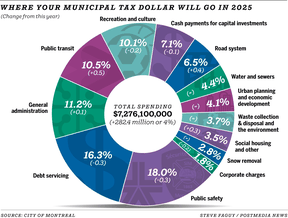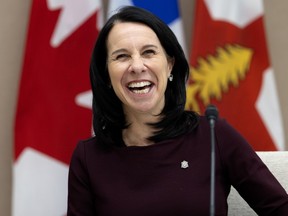As she tabled her final budget as mayor of Montreal on Wednesday, Valérie Plante reflected on how running the city has evolved since she first took office in 2017.

Article content
City budgets are normally a forward-looking exercise, a spending plan for the year ahead and a blueprint for upcoming investments.
But as Montreal Mayor Valérie Plante tabled her final budget Wednesday, after announcing she won’t run for a third term in next year’s municipal election, it was also a time to look back.
Plante reflected on her efforts to make Montreal greener, safer, more equitable and more livable without reaching too deep into the pockets of citizens. She also pondered how the work of running the city has evolved as municipalities are called upon to confront ever more complex and intense challenges — often without the necessary resources.
Advertisement 2
Article content
“All I can say is that from the first budget until now, I feel like the general context of managing the city has changed and the pressure is higher,” Plante said at Wednesday’s news conference. “I feel like I’m navigating the city through all kinds of crises.”
Besides the pandemic, an unexpected global emergency from which Montreal is still recovering, she rhymed off the opioid crisis, the mental health crisis, the cost-of-living crisis, the public transit funding crisis, the homelessness crisis, the housing crisis and, of course, the climate crisis.
Through all this, Plante said, her administration has had to adapt — and respect Montrealers’ capacity to bear the costs of tackling these social ills. Just over 63 per cent of Montreal’s $7.28-billion operating budget comes from property taxes, a model she denounced as “archaic.” But with Montrealers increasingly tapped out, this year’s budget was balanced with a 2.2 per cent hike for residential owners (once the borough’s portion is factored in) and 1.9 per cent for commercial taxpayers. Compared to Vancouver and Toronto, where taxes recently jumped about 10 and nine per cent respectively, Plante called Montreal’s relatively modest increase “un bon deal.”
Advertisement 3
Article content
“We need more fiscal tools and we’re doing work in many fields that are not our responsibility,” she said. “But we always raise our hands.”

With one year remaining in office, the budget is also a road map for Plante to cement her legacy.
Housing has always been one of her priorities. But early on, her focus was on stemming the exodus of families from Montreal. More recently, her attention has shifted to the humanitarian catastrophe playing out on city streets — the proliferation of encampments and the unhoused visibly suffering in all neighbourhoods.
Although homelessness is a shared responsibility among three levels of government, municipalities have the fewest resources. The city budget nevertheless added $3.3 million to the cause. This brings the total budget for homelessness close to $10 million. When new tax breaks for certain recognized non-profit organizations, including shelters, are factored in, aid for homelessness rises to $12 million.
“That’s four times more than when we arrived in office,” Plante said.
But she lamented that $100 million in funding that could help the unhoused has been held up in a tug-of-war between the federal and provincial governments.
Advertisement 4
Article content
“Winter is at our door,” she said.
Plante noted that during her two terms as mayor, the city has invested about $1 billion in housing. With her Loger+ strategy, she has set an ambitious target of ensuring 20 per cent of all new stock is off-market by 2050.
To accomplish this, the city bolstered the budget of the Service de l’habitation by $100 million for the next three years — and turned it into a “real department of its own,” Plante said. The budget allotted a new envelope of $38.2 million to help reach agreements with various partners to assist in creating and managing this non-market housing.
Montreal is also setting aside $566 million over 10 years from the $24.8-billion capital works budget to acquire strategic properties and lands for non-market construction, using the city’s newly granted right of first refusal.
The need for social and affordable housing is more urgent than ever. However, Plante’s attempts to improve the diversity of units in new developments, get the private sector to pitch in building off-market homes and get shovels in the ground for major new neighbourhoods like Namur-Hippodrome have proved difficult. After seven years in office, Plante doesn’t have a lot to show yet in terms of bricks and mortar, though the situation looks better on paper.
Advertisement 5
Article content
Even when it comes to new market housing, starts are down. They dropped steeply below the 10-year average of about 23,000 units in 2022. They have rebounded slightly in 2024, but not to previous levels. Projections for 2025 remain below 20,000 new units.
Fighting climate change has also been one of Plante’s priorities from the start. But over her seven years in office, global warming has gone from a looming threat to a frequent source of chaos. The remnants of two hurricanes damaged homes and flooded public infrastructure last summer alone.
Yet the call by municipalities seeking $10 billion over five years from Quebec to adapt to the climate crisis was only partially heeded.
Here again, the city is investing significant sums in resilience. The capital works budget prescribes $160 million in the coming decade for natural or hybrid infrastructure like sponge parks and roads, as well as $698 million to improve drainage. There is $336 million to create new parks and $271 million to acquire new natural spaces.
Grappling with extreme weather also means massive investments in water-main repairs. People love to grumble about the resulting orange cones and it might not be a vote-getter, Plante chirped, but repairs are critical to prevent the next geyser that might flood the homes of Montrealers.
In the home stretch of her tenure, Plante still has much work left to do.
“Climate change is not going to stop; inequalities are not going to stop,” she said. “I don’t want to scare the next mayor, by the way. It’s just that there are challenges.”
But as Plante was applauded by members of her administration and posed for photos with the budget documents, no one has officially stepped up to fill her shoes.
Recommended from Editorial
Advertisement 6
Article content
Article content





Comments